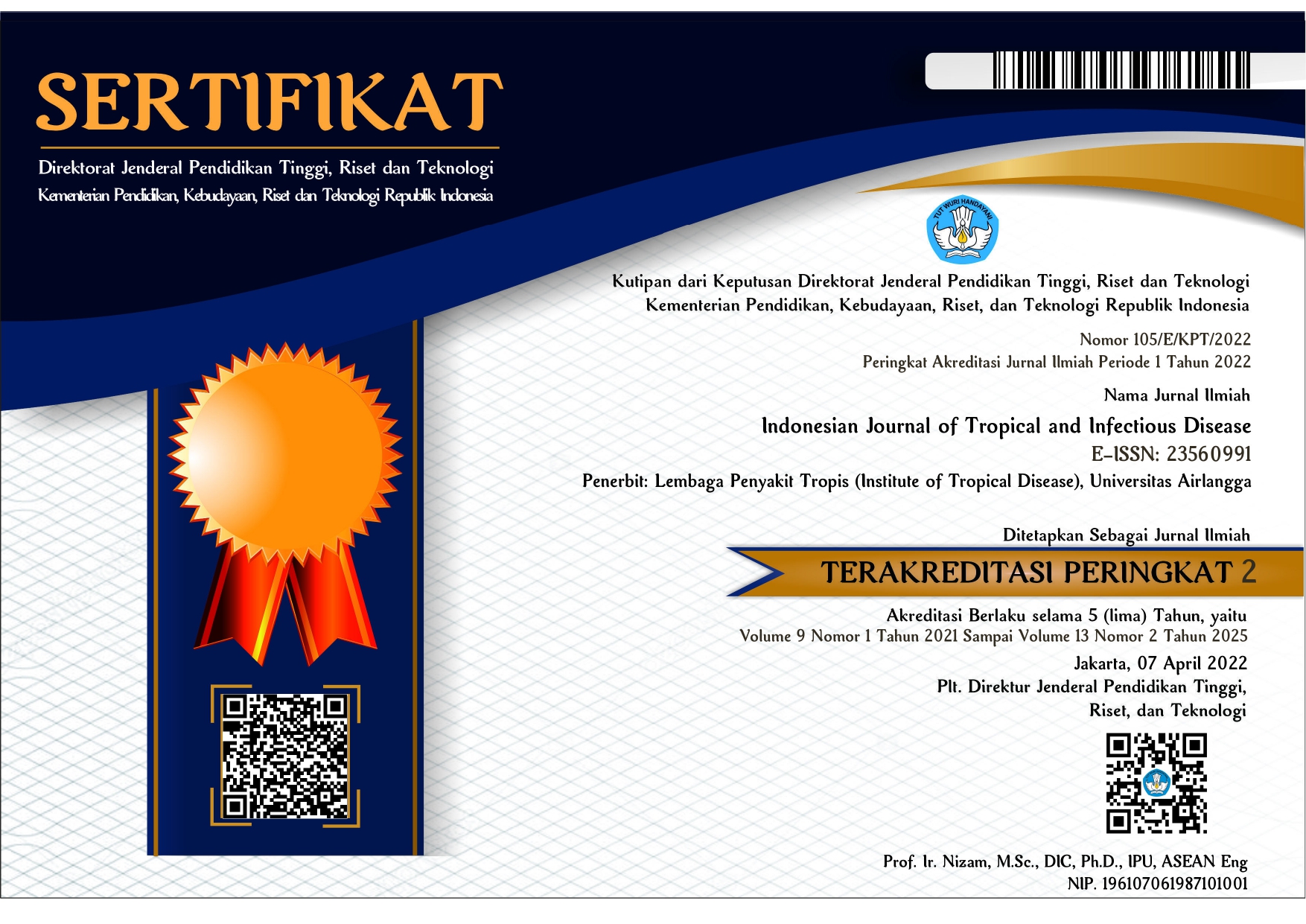Antibiotic Sensitivity Against Klebsiella spp. in the Post Debridement Culture an Open Fracture in Emergency Department of dr. Soebandi Hospital Jember
Downloads
Surgical site infection (SSI) in open fracture is often caused by bacterial contamination in the management of open fracture. Because of that, one of the most important thing in handling open fracture is debridement. Prophylactic antibiotics given are Cephalosporin and Aminoglycosides. Post-debridement culture is important in predicting the incidence of infection. One of the bacteria that is often found in post-debridement culture is Klebsiella spp. which can produce ESBL to fight β-lactam class of antibiotics. The purpose of this study was to determine antibiotic sensitivity against Klebsiella spp. in the post-debridement culture of cases of open fractures in the emergency department of dr. Soebandi hospital Jember. This study uses a laboratory exploratory research design. The sample of this study was the isolate of Klebsiella spp. which amounts to 5 from post debridement culture of open fracture patients in the emergency department of dr. Soebandi hospital Jember from March to May 2019.The method used is diffusion (Kirby Baurer) by matching using the CLSI standard table to determine sensitive, intermediate, or resistant. The results of this study showed that most antibiotics had resistance to Klebsiella spp., including β-lactam antibiotics, such as Amoxicillin, Ceftriaxone, Cefixime, Penicilin, Meropenem, and Cefadroxil. Vancomycin antibiotics are still sensitive to Klebsiella spp. in all patients. Gentamicin, Ciprofloxacin, Tetracycline, and Chloramphenicol antibiotics were sensitive in 1 patient. Erythromycin intermediates antibiotics against Klebsiella spp.. The conclusion of this study is that all β-lactam group antibiotics are resistant to Klebsiella spp while the most sensitive antibiotic is Vancomycin.
Calandruccio JH. Fractures, Dislocations, and Ligamentous Injuries of The Hand and Wrist - ClinicalKey. In: Campbell's Operative Orthopaedics. 2021. p. 3497–559.
Agarwal D, Maheshwari R, Agrawal A, Chauhan VD, Juyal A. To study the pattern of bacterial isolates in open fractures. J Orthop Traumatol Rehabil. 2022;8(1):1.
Halawi MJ, Morwood MP. Acute Management of Open Fractures: An Evidence-Based Review. Orthopedics. 2015;38(11):e1025–33.
Sop JL, Sop A. Open Fracture Management - StatPearls - NCBI Bookshelf [Internet]. StatPearls Publishing. 2022. p. 1–23.
Perry KL. Management of open fractures: part 1. http://dx.doi.org/1012968/coan2016213165. 2016;21(3):165–70.
Ali AM, Noyes D, Cogswell LK. Management of open fractures of the lower limb. http://dx.doi.org/1012968/hmed20137410577. 2013;74(10):577–80.
Griffin M, Malahias M, Khan W, Hindocha S. Update on the management of open lower limb fractures. Open Orthop J. 2012;6(1):571–7.
Zhu C, Zhang J, Li J, Zhao K, Meng H, Zhu Y, et al. Incidence and predictors of surgical site infection after distal femur fractures treated by open reduction and internal fixation: a prospective single"center study. BMC Musculoskelet Disord. 2021;22(1):1–10.
Hu Q, Zhao Y, Sun B, Qi W, Shi P. Surgical site infection following operative treatment of open fracture: Incidence and prognostic risk factors. Int Wound J. 2020;17(3):708.
Gupta S, Saini N, Sharma R, Kehal J, Saini Y. A Comparative Study Of Efficacy Of Pre And Post Debridement Cultures In Open Fractures. Internet J Orthop Surg [Internet]. 2012;19(3).
Cherian JJ, Lobo JO, Ramesh LJ. A Comparative Study of Bacteriological Culture Results Using Swab and Tissue in Open Fractures: A Pilot Study. J Orthop case reports. 2019;9(1):33–6.
Sitati FC, Mosi PO, Mwangi JC. Early Bacterial Cultures from Open Fractures - Differences Before and After Debridement. Ann African Surg [Internet]. 2018;14(2).
Finka R, Agustina D, Rachmawati DA, Suswati E, Mufida DC, Shodikin A. The Role of Pili Protein 38,6 kDa Klebsiella pneumoniae as a Hemagglutinin and Adhesin Protein which Serves as a Virulence Factor. J Agromedicine Med Sci. 2019;5(2):9.
Ghafourian S, Sadeghifard N, Soheili S, Sekawi Z. Extended Spectrum Beta-lactamases: Definition, Classification and Epidemiology. Curr Issues Mol Biol 2015, Vol 17, Pages 11-22. 2014;17(1):11–22.
Tandirogang Y, Esa T, Sennang N. Kuman dan Kepekaan Antimikroba di Kasus patah Tulang Terbuka. Indones J Clin Pathol Med Lab. 2018;19(2):88.
Syahputra RRI, Agustina D, Wahyudi SS. The Sensitivity Pattern of Bacteria Against Antibiotics in Urinary Tract Infection Patients at RSD DR. Soebandi Jember. J Agromedicine Med Sci. 2018;4(3):171–7.
Matos MA, Lima LG, de Oliveira LAA. Predisposing factors for early infection in patients with open fractures and proposal for a risk score. J Orthop Traumatol. 2015;16(3):195–201.
Elniel AR, Giannoudis P V. Open fractures of the lower extremity: Current management and clinical outcomes. EFORT Open Rev. 2018;3(5):316–25.
Agel J, Rockwood T, Barber R, Marsh JL. Potential predictive ability of the orthopaedic trauma association open fracture classification. J Orthop Trauma. 2014;28(5):300–6.
Zalavras CG. Prevention of Infection in Open Fractures. Infect Dis Clin North Am. 2017;31(2):339–52.
O'Brien C, Menon M, Jomha N. Controversies in the Management of Open Fractures. Open Orthop J [Internet]. 2014;8(1):178–84.
Ashurst J V., Dawson A. Klebsiella Pneumonia. StatPearls. 2022;
Bengoechea JA, Sa Pessoa J. Klebsiella pneumoniae infection biology: living to counteract host defences. FEMS Microbiol Rev. 2019;43(2):123.
Hull PD, Johnson SC, Stephen DJG, Kreder HJ, Jenkinson RJ, Johnson ï® S C. Delayed debridement of severe open fractures is associated with a higher rate of deep infection. https://doi.org/101302/0301-620X96B332380. 2014;96-B(3):379–84.
You DZ, Schneider PS. Surgical timing for open fractures. OTA Int Open Access J Orthop Trauma. 2020;3(1):e067.
Agustina D, Nadyatara K, Mufida DC, Elfiah U, Shodikin MA, Suswati E. Faktor Virulensi Outer Membrane Protein 20 kDa Klebsiella pneumoniae sebagai Protein Hemaglutinin dan Adhesin. eJournal Kedokt Indones. 2020;7(3):200–4.
Tri Nugroho Supranoto Y, Habibi A, Zulaikha S, Mutia R, Nyoman Semita I, Agustina D, et al. A Case Report: Surgical Site Infection of Open Fracture Grade IIIC Caused by Methicillin-Resistant Staphylococcus aureus (MRSA). J Asian Med Students' Assoc. 2021;9(1).
Tennent DJ, Shiels SM, Sanchez CJ, Niece KL, Akers KS, Stinner DJ, et al. Time-Dependent Effectiveness of Locally Applied Vancomycin Powder in a Contaminated Traumatic Orthopaedic Wound Model. J Orthop Trauma. 2016;30(10):531–7.
Ashwin H, Thomas G. A prospective study on results of bacterial culture from wound in type III compound fractures. Int J Res Orthop. 2018;4(6):935–9.
Nitzan O, Suponitzky U, Kennes Y, Chazan B, Raul R, Colodner R. Is chloramphenicol making a comeback? - PubMed. Isr Med Assoc J. 2010;12(6):371–4.
Mangala A, Arthi K, Deepa R. Comparison of predebridement and debridement cultures in predicting postoperative infections in compound fractures. J Clin Diagnostic Res [Internet]. 2018;12(7):DC06–9.
Sanchez G V., Master RN, Clark RB, Fyyaz M, Duvvuri P, Ekta G, et al. Klebsiella pneumoniae Antimicrobial Drug Resistance, United States, 1998–2010 - Volume 19, Number 1”January 2013 - Emerging Infectious Diseases journal - CDC. Emerg Infect Dis. 2013;19(1):133–6.
Khan N, Hassan F, Naqvi B, Hasan S. Antimicrobial activity of erythromycin and clarithromycin against clinical isolates of Escherichia coli, Staphylococcus aureus, Klebsiella and Proteus by disc diffusion method - PubMed. Pak J Pharm Sci. 2011;24(1):25–9.
Copyright (c) 2022 Indonesian Journal of Tropical and Infectious Disease

This work is licensed under a Creative Commons Attribution-NonCommercial-ShareAlike 4.0 International License.
The Indonesian Journal of Tropical and Infectious Disease (IJTID) is a scientific peer-reviewed journal freely available to be accessed, downloaded, and used for research. All articles published in the IJTID are licensed under the Creative Commons Attribution-NonCommercial-ShareAlike 4.0 International License, which is under the following terms:
Attribution ” You must give appropriate credit, link to the license, and indicate if changes were made. You may do so reasonably, but not in any way that suggests the licensor endorses you or your use.
NonCommercial ” You may not use the material for commercial purposes.
ShareAlike ” If you remix, transform, or build upon the material, you must distribute your contributions under the same license as the original.
No additional restrictions ” You may not apply legal terms or technological measures that legally restrict others from doing anything the license permits.























